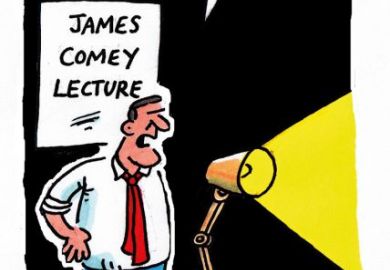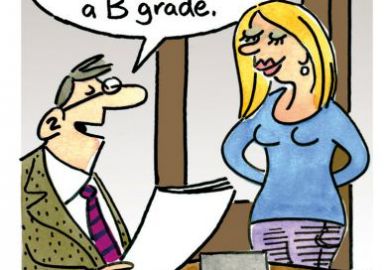
As Times Higher Education went to press, British universities were anxiously awaiting details of the UK’s plans for future participation in the European Union’s science programmes. The Times reported on 4 September that the country would offer to pay more than £1 billion a year after Brexit to stay in research programmes such as Horizon 2020. According to the newspaper, the proposal was due to be set out in the latest of a series of “position papers” on Brexit scheduled to be published on 6 September. The position paper was also expected to point out that Horizon 2020 already has non-EU “associate members” such as Israel, Norway and Switzerland. Less clear was whether the paper would also mention that countries such as Switzerland also abide by freedom of movement rules in order to take part – a substantial potential stumbling block to any UK attempt to continue to participate in the scheme.
A university in Canada lost almost C$12 million (£7.5 million) to an email phishing scam. Staff at MacEwan University in Edmonton unwittingly paid millions into a fraudulently created bank account after an email convinced them that legitimate bank details for a client had changed, the BBC reported on 31 August. Most of the money has been traced to bank accounts in Hong Kong and Montreal, and the funds have been frozen while lawyers attempt to recover the money. “There is never a good time for something like this to happen,” university spokesman David Beharry said in a statement. “As our students come back to start the new academic year, we want to assure them and the community that our IT systems were not compromised during this incident.” An initial internal investigation has found that the processes for changing banking information were “inadequate” and that staff had missed opportunities to identify the fraud, the BBC report said.
Donald Trump found a way to make money out of higher education via Trump University – although the resulting legal settlement suggests that it was less than a model approach – and his son has managed to do the same. Donald Trump Jr will be paid $100,000 (£77,000) to speak at the University of North Texas in October, delivering a 30-minute speech and then taking a 30-minute Q&A session (for which the questions will be submitted in advance), campus newspaper North Texas Daily found through a Freedom of Information request. “According to the contracts, along with his payment, Trump Jr. will receive lodging, meals and travel accommodations on behalf of UNT at a maximum total cost of $5,000,” it added.
Betsy DeVos, the US education secretary, has appointed Julian Schmoke, a former official at for-profit DeVry University, to lead the Department of Education’s Student Aid Enforcement Unit, which is aimed at tackling fraud by universities, Politico reported on 30 August. “DeVry’s parent company, which has since rebranded as Adtalem Global Education, last year agreed to pay $100 million to resolve allegations by the Federal Trade Commission that the for-profit college company misled students about their job and salary prospects,” it added. The company also settled with the Department of Education over similar claims, and “Obama administration officials cited those cases against DeVry as they announced the formation of the Student Aid Unit last year”. On learning of Mr Schmoke’s appointment, Democratic Senator Chris Murphy tweeted, “This is a joke, right?”, and his colleague Elizabeth Warren followed up by asking whether Ms DeVos was “trolling us”. Clearly Ms DeVos believes that when it comes to leading a unit set up to tackle fraud, a former DeVry official should know the territory.
A University of Cambridge student who burned a £20 note in front of a homeless man will not be expelled. Pembroke College had come under pressure to eject Ronald Coyne over the incident in February, in which he was filmed, wearing a bow tie and coat-tails, setting the money alight in front of the rough sleeper. However, he has kept his place at the college after writing a public note of apology in which he sets out how he is trying to “remedy some of the hurt caused by my actions”, The Sun reported. “I have addressed the root causes of my behaviour by attending awareness classes, relating to both alcohol and social inclusion,” he says. He also reveals in the letter that threats of violence have been sent to his family home over the incident.
Register to continue
Why register?
- Registration is free and only takes a moment
- Once registered, you can read 3 articles a month
- Sign up for our newsletter
Subscribe
Or subscribe for unlimited access to:
- Unlimited access to news, views, insights & reviews
- Digital editions
- Digital access to THE’s university and college rankings analysis
Already registered or a current subscriber?


